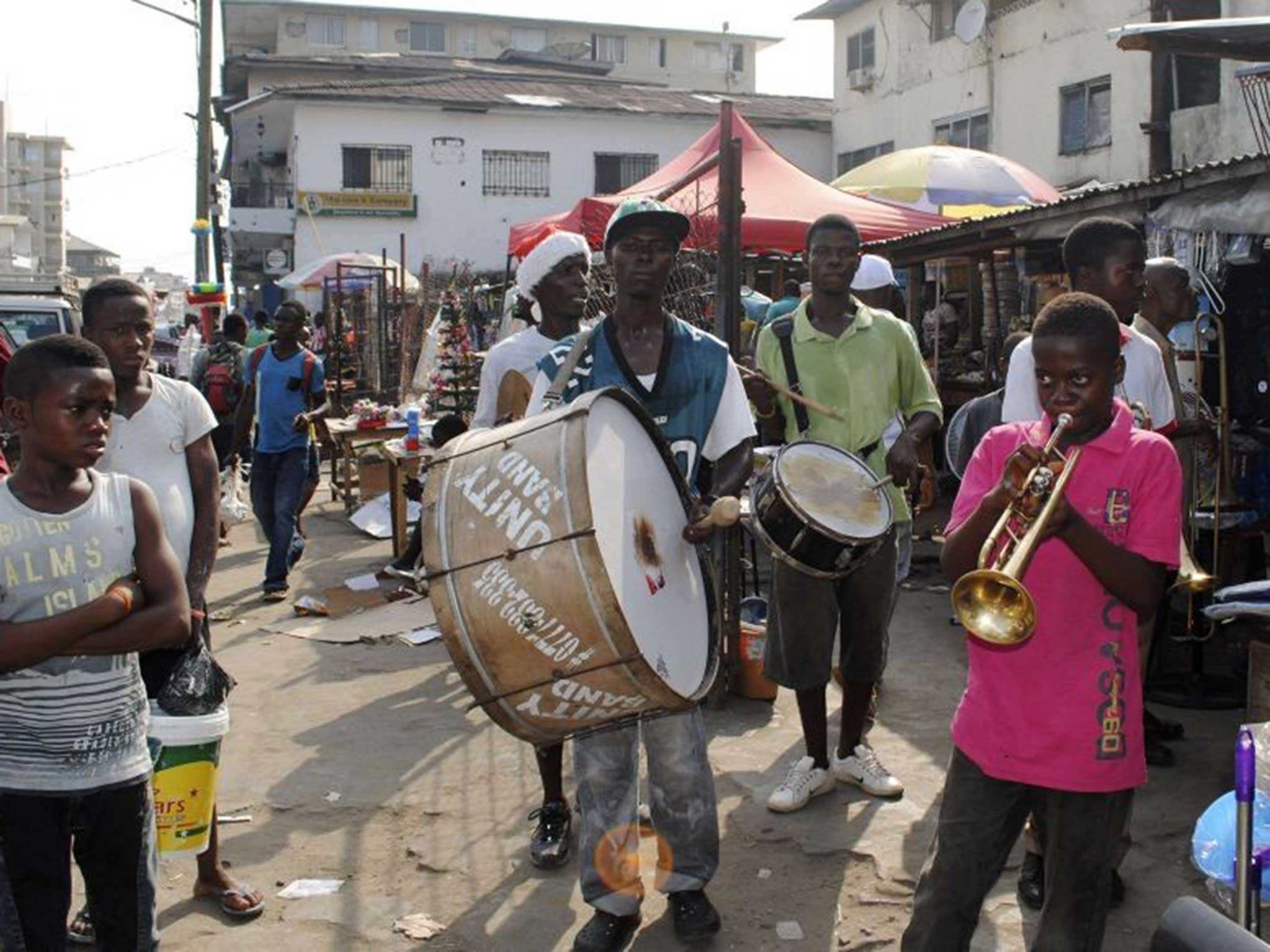Ebola outbreak: New Year holiday brings respite for Liberia in fight against disease
There was a moment of optimism in the country's desperate struggle against the disease on New Year’s Eve when the curfew was lifted. But despite progress, the biggest battles still have to be won

Men, women and children walked slowly through the narrow alleys of Monrovia’s largest slum on Wednesday night, holding candles and chanting slogans in defiance of Ebola as they headed home from late-night church services ushering in the New Year.
It was a rare piece of freedom for Liberia’s residents, after the government lifted for one night only a curfew that had been in place since September in an effort to stop the spread of Ebola.
For residents of West Point, Monrovia’s largest slum, the virus is a threat to the entire community. Government fears that the slum could ignite an apocalyptic outbreak in the city made it the subject of a brutal and failed armed quarantine earlier in the year. But the epidemic has not overcome the slum; and although uncertainty lies ahead, the lifting of the curfew meant New Year’s Eve was still a time to celebrate.
The old Liberian New Year’s adage, “Happy New Year, Me No Die Oh”, took on a new meaning this year.
At Bethel World Outreach Church in West Point, an usher perched on a stool with a radar gun thermometer ordering people to wash their hands with a chlorine and water solution and taking their temperature before they could enter to check for symptoms of the disease. The church’s young pastor sweated through his white shirt as he prophesied prosperity for his congregants in 2015.
“May the Lord make every area of your life better. If you work and you fail, you will go back and succeed!” he said.
Thoughts of a prosperous future seemed unimaginable when Monrovia came to a standstill this summer. Men in white moon suits collecting bodies as people died outside Ebola treatment centres became an everyday sight. Around 3,500 people are believed to have died from the deadly virus in Liberia, according to the most recent reports from the Ministry of Health, a figure that is close to half of all Ebola deaths in the region. Figures released from the World Health Organisation on Wednesday put the total number of deaths across West Africa at 7,905, with more than 20,000 people infected.
Schools are closed and economic growth projections have plummeted. But with an inflow of medical staff and newly trained Liberian health workers, and with more Ebola treatment units opening, cases have reduced dramatically and the sense of fear and denial has waned.
Things have changed in West Point since the time community members illegally buried bodies in the dark of the night and ransacked a school building used as an Ebola holding centre because they thought the government was bringing the disease to West Point. People have accepted the government slogan that “Ebola is Real” and practices have begun to change, particularly in churches like Bethel.
As the pastor announced the passage of 2014 at the stroke of midnight, he told his congregants to salute one another instead of embracing or shaking hands.
In pictures: The village where Ebola started
Show all 5But community members in West Point are concerned about a premature declaration of victory and a new laxity in adhering to health measures such as washing hands in chlorine and avoiding touching. Kenneth Martu, a community leader in West Point who manages an ambulance service funded by a non-governmental organisation, is concerned about growing complacency in the community and Liberia at large and criticised the government for claiming it was 90 per cent of the way to becoming ebola-free. “This is not over. A lot of people from rural areas where there have been outbreaks could come into the community. People see our ambulances and ask us why we are running the siren, because they say Ebola is finished,” Mr Martu said. But he agrees that the city is in a much better position to handle a third outbreak.
The Black Hawk helicopters of the US military mission cut through the blue skies. This week the US mission completed its training of 1,300 health workers and the construction of 14 Ebola treatment units. The US is due to make a make a decision on 15 January on the future of the mission and whether it will deploy troops to neighbouring countries including Guinea, or Sierra Leone, where the outbreak is still in full force.
Monrovia itself is not yet Ebola-free. The majority of the nation’s cases are here in the capital and more continue to emerge in the city’s slum communities such as Clara Town and New Kru Town, home to Redemption Hospital where the urban outbreak erupted earlier this year.
But on New Year’s Day, an Ebola holding centre run by Doctors Without Borders was holding only one-suspected Ebola patient. The ambulances and piles of people who once lay lifeless outside the front of the small hospital some months back have disappeared.
While the chaos of last year has calmed, some Liberians are still entering the New Year with trepidation.
Daniel Samco, 34, stood by his home in the fishing community of Fanti Town, West Point, mending the engine of a small boat as a group of fishermen splayed out their catch nearby. He decided to stay indoors today, claiming people in the community were becoming too complacent.
“Look at the doors: you don’t see buckets or people washing their hands,” said Mr Samco. “People are finding complacency and thinking it is over. We can’t have that notion until the WHO says Liberia is Ebola-free.”
Subscribe to Independent Premium to bookmark this article
Want to bookmark your favourite articles and stories to read or reference later? Start your Independent Premium subscription today.

Join our commenting forum
Join thought-provoking conversations, follow other Independent readers and see their replies